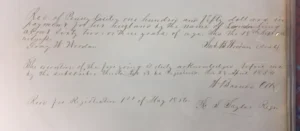Submitted by Lisa Y. Henderson; Edited and vetted by Cheri Todd Molter
On 2 September 1950, in the column “Looking Backward,” the Wilson Daily Times published Hugh B. Johnston’s transcriptions of war-time letters written by George W. Woodard, including the one below:
Camp Near Orange Court House, VA., November the 16, 1863
Mrs. Mary J. Edwards, Wilson P.O., Wilson County, N.C.
Dear Sister,
I take my pen in hand to write you a few lines to let you know that I am well at this time and hoping you the same. Bunyan, I want to hear from you. Let me hear from you and let me know how you are getting along. Bunyan, I want you to let me know how everything is getting along and write me all the news. I heard that you have been having chills. I want to know whether it was you who shot your thumb, or not. Tell Mary Gray to write to me every time she can. Tell Sister Betty to write to me, for I want to hear from her. Tell Nanney also to write to me. Tell Aunt Penny I want to see her. Tell Uncle London I want to see him very badly. I have nothing to write, only very hard times here. We are expecting to have to march every minute. I must come to a close by saying I remain your dear brother until death. Excuse my bad writing. George Woodard
——
George Washington Woodard, the son of James Bullock Woodard and Sallie Peele Woodard, enlisted in the Confederate Army in April 1862. The twenty-five-year-old Wilson County farmer served as a private in Company A of the 55th North Carolina Infantry. Debilitated by chronic diarrhea, Woodard died 23 March 1864 at a military hospital in Gordonsville, Virginia.
“Aunt Penny” and “Uncle London” were Penny Lassiter Woodard, a free woman of color, and London Woodard, her enslaved husband. Penny worked for the Woodard family and had reared George W. Woodard after his mother’s death. George’s father, James B. Woodard, had purchased London Woodard from another Woodard family member and had sold him to Penny in 1856.
Editor’s Notes:
More information regarding people named:
Mary Jane Edwards: George addressed his letter to Mary Jane Edwards, his sister. She was married to Sergeant William Henry Edwards at the time it was written. In 1861, William H. Edwards joined the Confederate Army, and, on June 15, 1864, he was mortally wounded at Petersburg, Virginia, while serving in Company H of the North Carolina 4th Cavalry.
Bunyan: “Bunyan” was John Bunyan Woodard, one of George’s older brothers. When he joined the Confederate Army in 1861, Bunyan was a twenty-eight-year-old Wilson County farmer. He served in Company F of the 4th North Carolina Infantry. On May 3, 1863, Bunyan was wounded and taken prisoner in Chancellorsville, Virginia. Two days later, he was hospitalized at Washington, D.C. A month later, Bunyan was confined at the Old Capital Prison in D.C. and was eventually paroled on June 25, 1863. George’s letter was written on Nov. 16, 1863, so perhaps Bunyan was furloughed after he was released and staying in Wilson County with their sister before returning to his company to serve. He did return, though, because his records state that he was captured on October 22, 1864, at Strasburg, Virginia. He was confined at Point Lookout, Maryland, for the remaining duration of the war. On May 14, 1865, he took the Oath of Allegiance and was released.
Mary Gray: The “Mary Gray” George mentioned was most likely Mary Barnes Woodard, the widow of Gray Woodard, George’s older brother who had died at Gettysburg, Pennsylvania, a few months earlier. Gray was a thirty-four-year-old Wilson County farmer when he enlisted in the Confederate Army on April 29, 1862—presumably with George, since that was the date he enlisted, too. Like George, Gray also served in Company A of the 55th North Carolina Infantry. According to his military records, Gray was killed on July 1, 1863.

